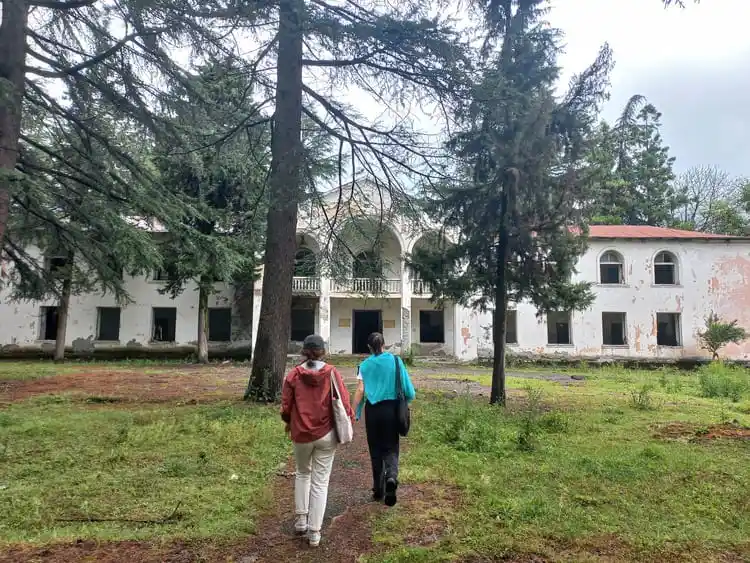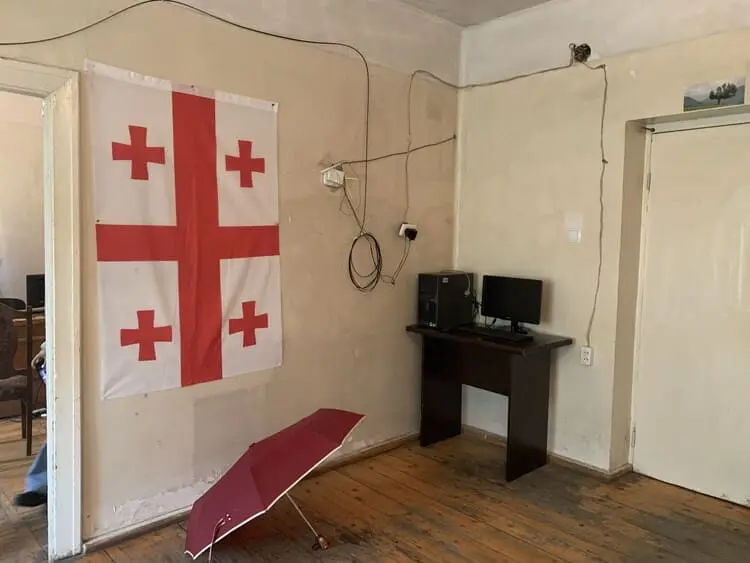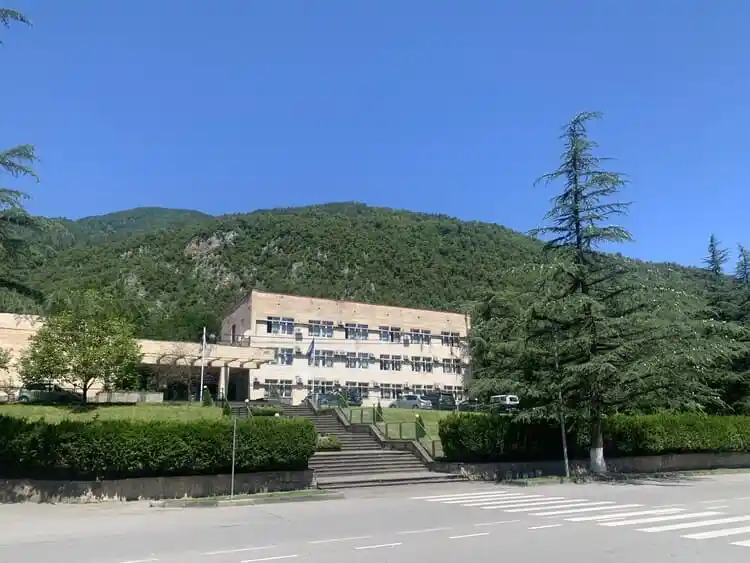Authors: Salome Gazdeliani and Nino Mirianashvili
Prime Minister Gharibashvili visited Tsageri and Lentekhi in July and met with the local residents. During the meetings in both towns, the same group of individuals stood in the front rows to express gratitude to the Prime Minister. Photos of these individuals quickly spread across social media, with mentions that they were employees of a Non-Entrepreneurial (Non-Commercial) Legal Person (N(N)LP) operating in Tsageri.
N(N)LPs can be registered by citizens as well as government or local self-governmental bodies. These entities are widespread in the public sector, with a significant presence in education, science, and culture.
In regions of Georgia, particularly in smaller towns, N(N)LPs play a crucial role in providing employment opportunities. Our summer visit to Tsageri involved interviews with residents who emphasized the significance of these entities in generating job opportunities.
Currently, the municipal budget supports 17 N(N)LPs in Tsageri, with an annual expenditure exceeding 5 million GEL. These organizations collectively employ over 800 individuals, while the entire population of Tsageri, including its villages, stands at 7,700 people.
This means that more than 10 percent of the local population is employed at organizations established by the government.
Koka Kighuradze, the founder of the “Governmental Systems Development Center,” highlights that this pattern is not exclusive to Tsageri. He points out that such instances exist in various municipalities across the country, where N(N)LPs tend to have more employees than necessary.
Kighuradze provides an insight: “I am unaware of any municipality where a similar situation does not occur. Take Tkibuli Municipality, for instance, where the N(N)LP in the cultural sector had 205 employees, and the N(N)LP in the sports sector had 105. These figures have consistently posed a challenge.
“When private sector job opportunities are lacking, the government often steps in as a source of employment for the local population”
Koka Kighuradze
The impact and involvement of the local government are evident in every aspect of N(N)LPs’ operations. For example, the mayor holds the authority to appoint and dismiss the heads of these organizations.
“The specifics and criteria of this process are not clearly defined in the legislation, which raises the risks of irrational disposal of budget funds,” states a report published by the Institute for Development of Freedom of Information (IDFI) in 2021. IDFI, an NGO focused on transparency and access to information, has been dedicated to studying the activities of N(N)Ls and assessing the efficiency of funds allocated to them for several years.
During our time in Tsageri, we took the opportunity to investigate the N(N)LPs operating in the town, aiming to understand the conditions under which they function and observe the number of individuals present during working hours.

N(N)LP “Local Health Center” is situated in the rear of a destroyed hospital building. Despite having 28 employees and receiving funding of up to 119 thousand GEL this year, only six individuals were present during our visit. As we were told, the government has promised to replace the building several times, but no action has been taken thus far. Notably, the center stores vaccines and proper storage conditions are crucial for them.
The organization’s director, Thea Gurguchiani, expressed concerns about the excessive staffing levels within the organization, stating: “I am not opposed to providing employment opportunities, everybody wants to have some kind of income, but there is an inflated number of staff. Recently, during Covid-19, we’ve only hired one person. The practice of increasing employees began around 2007-08, and by 2010, the numbers continued to grow.” Gurguchiani acknowledged the challenge of having more staff than necessary but emphasized that addressing this issue is beyond her individual capacity. She further mentioned, “The National Center for Disease Control has provided recommendations for determining staffing levels in the “Health Center” of Tsageri based on the local population. Tsageri has a population of up to 10,000 people, and the number of employees at the organization exceeds the recommended figure outlined by the National Center for Disease Control.
We also visited the N(N)LP “Center for Promoting the Development of Local Self-Government and Farming in Administrative Units.” Upon arrival, we encountered five employees in an empty room, explaining that they had recently moved and were still awaiting inventory. The center has six more employees, though we didn’t meet them during our visit. According to the information provided, the center had 180 employees in previous years, but due to a reorganization, only 11 employees remained.
In Tsageri, N(N)LPs underwent restructuring in 2022, likely in response to concerns highlighted in a report published by the State Audit Service in 2021. The audit service investigated the effectiveness of the activities of N(N)LPs created by municipalities and the funds allocated to them. The report emphasized: “Funding for N(N)LP is based on general planning, with specific goals and program performance evaluation indicators not defined. Municipalities do not measure the effectiveness of the funds spent on subsidies.”
Currently, the government is struggling to fulfill its primary function of addressing the population’s infrastructural challenges and creating proper living conditions. During our time in Tsageri, we conducted at least twenty interviews, delving into people’s daily concerns. Nearly every interview highlighted the acute issues of lacking natural gas and proper roads. Some interviewees even expressed that the availability of natural gas could encourage people to settle in the area permanently.
Tsageri municipality has 58 villages with around 9 thousand residents, based on 2020 data. The population’s median age is 51, indicating a trend where young people are leaving the region to relocate to larger cities. The depopulation of mountain villages, especially among the younger demographic, is not unique to Tsageri; it’s a widespread issue in many parts of Georgia. The contributing factors include disorganized infrastructure, the absence of essential services, and a prevailing sense of hopelessness and uncertainty about the future.


However, there are funds available in local budgets that could be utilized to organize infrastructure in small towns and to provide at least the essential services to the population. Unfortunately, these funds are frequently misused without a clear purpose or consistency, and there is a lack of accountability for such expenditures. As a result, the population witnesses fewer tangible results.
The United Nations, of which Georgia is a member, introduced 17 sustainable development goals in 2015 to bring more benefits and prosperity to the world population. One of these goals is to establish sustainable and safe settlements and cities where everyone has access to quality and essential services. Since 2015, Georgia has aligned itself with these goals as a member state of the United Nations. However, the projects financed by the government from the budget often fail to contribute effectively to achieving these goals.
Since 2017, the N(N)LP “Youth, Community Relations, and Perspective Planning Center” has been operational in Tsageri, employing 69 people, with an annual budget allocation of 348,000 GEL. The organization aims to unlock the municipality’s youth’s intellectual, spiritual, and physical potential while fostering appropriate conditions. The center coordinates various activities, including concerts, cultural events, and film screenings. Upon our visit, we interacted with eight individuals at the center who informed us about additional employees dispersed in the villages. These employees actively engage with residents, seeking their input on the events they want to see organized. Throughout our conversations, Tsageri residents consistently expressed concern about the declining number of young people in the municipality. Consequently, the utilization of services provided by this center is diminishing.
“What is happening now is completely legal. It may be unfair, ineffective, and used for political purposes, but there is no conflict with the law. There is no upper limit on the number of employees in N(N)LPs,” Koka Kighuradze, an expert in self-governance issues, tells us. When asked about potential solutions, Kighuradze suggests introducing a legal and political system that curtails the municipality’s freedom in such matters. He also believes that the solution is for the city councils and citizens to react more strictly to such cases. “The solution lies in the change of legislation and political environment,” Kighuradze tells us.
During our stay in Tsageri, the absence of representatives from opposition parties and their apparent inactivity was noticeable. In an attempt to understand how they oversee the activities of the local government, we spoke with Akaki Meshveliani. He was part of the opposition party “For Georgia” in the 2021 elections. Meshveliani informed us that from 2019 to 2021, he worked as an expert in the N(N)LP “Center for the Promotion of Local Self-Government and Farming Development in Administrative Units.” However, he admitted he was unsure of his specific expertise and responsibilities during his tenure. Meshveliani shared that he did not go to work every day, and there were individuals on the staff whom he had never seen at work. At that time, 180 people worked in his organization.

He was dismissed in December 2021, officially on the grounds of the reorganization. However, he believes that his termination was politically motivated. Unfortunately, we could not discuss this matter with the City Hall, as they did not respond to our letter nor agree to an interview.
Meshveliani shared his perspective on N(N)LPs, stating: “All N(N)LPs are unnecessary expenses for the budget, the country, and the region. I don’t think anyone will talk to you about this; people live in such poverty that even those small incomes are important, and no one wants to lose them.”

The article was prepared within the long-term study in investigative journalism. The training is conducted by “iFact” with the support of “Friedrich Nauman Foundation for Freedom”.










